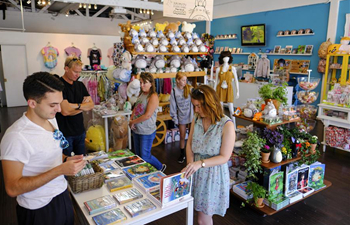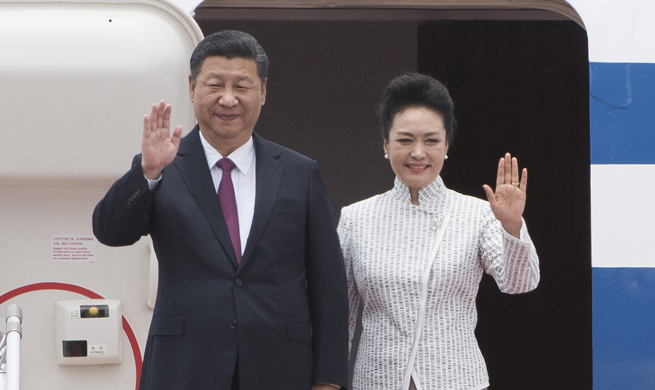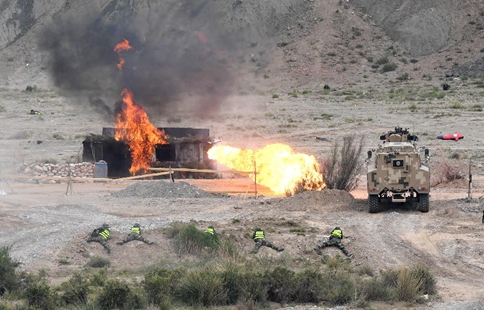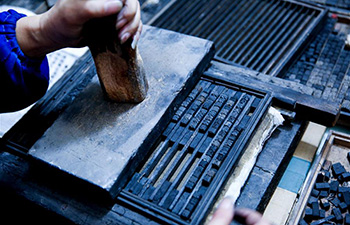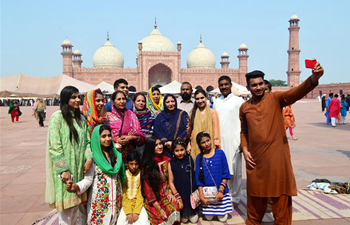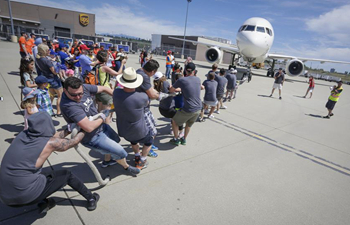By Sportswriters Xiao Yazhuo, Wang Chunyan
XILINHOT, China, June 29 (Xinhua) -- Against the blue sky dotted with sparse white clouds, the 69-year-old Lamu was feasting her eyes on the Mongolian wrestling matches, only dozens of meters ahead on the grassland, as the most popular traditional Naadam for Mongols was being held for the first time after a hiatus of 28 years at her home Sumu (Town), in the Authentic Blue Banner (County) of Xilin Gol League (City), Inner Mongolian Autonomous Region.
"Naadam has become an indispensable part of life for people on the Prairie, we love it and embraced it like blood in our bodies," said Lamu on Wednesday, who sat on a camp chair with her legs stretching out naturally on the grass, which blows freshness of the air in a summer breeze, "I like Naadam since I was a little kid, and I still walk around to watch three to four Naadams every year even I am an elder grandma. It 's just a fun time for people, like us Mongols, to enjoy a big party."
With a long history of some 800 years, dated back to 1225 in a written stone carvings of Genghis Khan, the founder of the Mongolian Empire, Naadam had been held as military training during the ancient Dynasty of Yuan, when the three events of Mongolian wrestling, horse-racing and archery became the Triple Skills requested to be mastered by every Mongolian man. Through centuries of evolution, the Triple Skills remain unchanged, and has been adopted strictly by the people on the Prairie.
With a literal meaning of "games", Naadam has been enriched with more and more folk events generation after generation, and women are now also allowed to compete along with their husbands and brothers, as all the events are open to all people regardless of either age or gender, and every match is a do-or-die competition.
As a popular game on the Prairie, the number of Naadams is very hard to be counted in Inner Mongolia every year, as the Mongols can and always host their private Naadams as a way of celebration for many reasons, such as livestock harvest, family weddings, birthdays, or any other spiritual gatherings.
Lamu said that the ongoing Naadam was one of the biggest she has ever seen nearby, as the hosting Saiyinghuduoga Sumu (town) has combined three Sumus decades ago under the administrative re-arrangement of the League (City).
"I came here with my two sons, one will compete as a wrestler and the other as horse rider. We don't care who will be the winners, we come here just for fun," Lamu said.
According to local governor Alatengbagen, there are roughly one thousand competitors, one sixth of its whole Sumu population of 5,800, in the key Triple Skills, as well as other three events, such as tug-of-war and Mongolian chess, during the three-day Naadam, which has attracted more than 10,000 enthusiast people from four ethnic nationalities of Mongolian, Man, Hui and Han, some of them even drove hundreds of kilometers for the fiesta.
Mongolian wrestling, also named Bokh, has remained to be the most popular event, with eye-catching traditional back-only jackets and colorful pants.
"Bokh is different from any other kinds of wrestling. All the matches are open classes, without limits of age, gender and duration. Any part of the body, other than the feet, touches the grassland, meaning the defeat and elimination from the Naadam," explained Huqun, a local young wrestler.
What made the 24-year-old stands out from the others is a cloth ring around his neck with colorful strips flowing in the wind.
"It's a Jiang-ga, the holy symbol of top honor for our wrestlers. Only the winner of a 256-member tournament or who wins four times from any 128-member tournament, will be eligible for the Jiang-ga," Huqun said with a big toothy smile across his face. And the number of strips means the times of his victories in any Naadam of any kind.
Huqun said his father was also a Bokh wrestler, and he started to learn the game as a family heritage from his father at a very young age.
"It's our tradition, I have been loving it since childhood," said Huqun. "Four years ago, I joined in a wrestling club in the Banner (county) for professional training and last year I had my Jianga after winning a 256-man tournament."
The 44-year-old Baoer was a former wrestler, but has switched to another "Manly Skill" - archery.
"I began to practice archery four years ago and we even established an archery association in our Banner (county)," said Baoer, "Now we have already had 57 members, 27 of them are competing at the Naadam."
Baoer said that all the archers have their own hand-made bows, which is made of oxhorn. And he and his fellows train at a local school, sometimes they also teach students archery.
"It's part of our traditional culture. I want to do something to help pass it down," Baoer said, "Many of our students are very interested in the sport of archery. It's a good sign and we are willing to help promote it."
Apart from wrestling and archery, horse racing is the last but not the least of Triple Skills. Unlike the Western style, Mongolian horse racing in Naadam features events of horse walking, sprints, and 15-30 endurance races on the prairie.
Both sprint and endurance races are judged by timing of finish, with the latter being most attractive to teenagers, and kids especially, and horse walking is a further showcase of their perfect communication between the horse and the rider, both spiritually and technically.
"In horse walking, the horse should uplift or put down its legs of the same side at the same time, which makes the riders feel comfortable enough on the back of the horse," said Taogentemur, who ranked fourth in the horse walking competition.
The 45-year-old horseman now breeds some 30 horses. To his mind, the horses are surely the members of his family. And riding a horse is one of the biggest passion in his life.
"A day would be boring and tiring if I didn't sit on the back of the horse," said Taogentemur, "I have two daughters, they are all good at riding. It's like a kind of inherent skill for our herdsmen."
The weather on the prairie is always changing. As the competitions were still underway, the sky was overcast and then started to rain. But no one seemed to notice it, with their eyes gluing to the games on the grassland.
"Our herdsmen were very supportive when we decided to host the Naadam, and they volunteered to donate the prizes for a total value of 200,000 RMB, either in cash or livestock including sheep, cows and even camels," said Alatengbagen, the governor of the Sumu (town).
"We host the Naadam for the people, and the only criteria for a good Naadam is whether the people enjoy it or not. Obviously, we have made a successful Naadam," said Alatengbagen.







